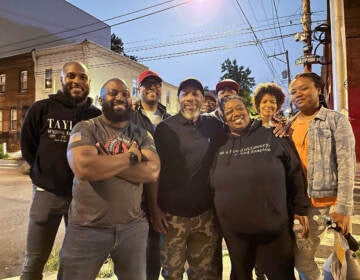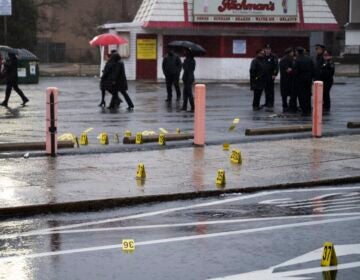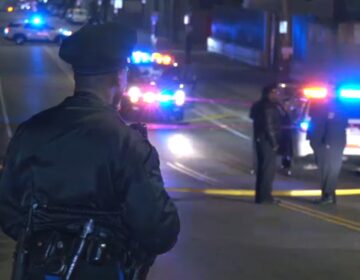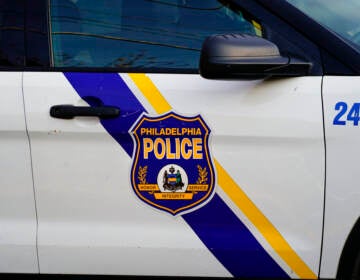Violence-free zone? House of Umoja looks to 70s-era peacemaking practices to keep teens safe
The House of Umoja has been credited with helping to quell Philly’s gang violence crisis in the 1970s. Now it wants to train a new generation of peacemakers.
Listen 5:41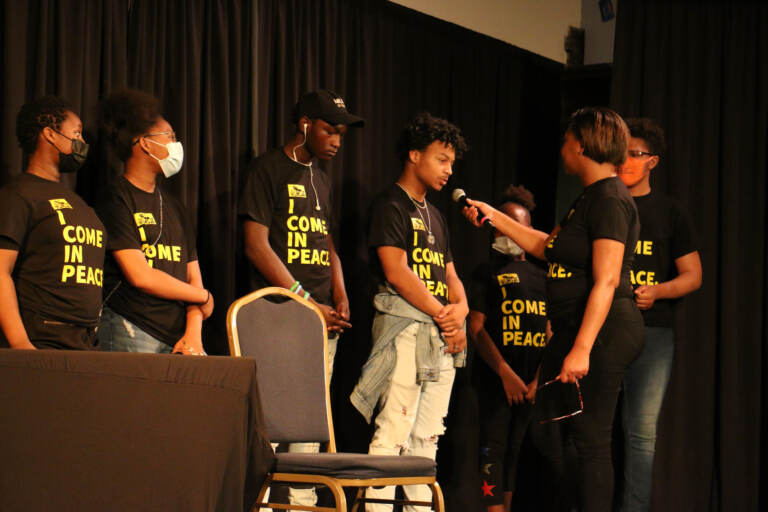
Monique Dudley, director of career development at House of Umoja, interviews Youth Peace Corps graduates about their goals and plans during a ceremony at the Rotunda in West Phialdelphia. (Emma Lee/WHYY)
Hameen Jackson has his heart set on professional football. For a while, he was waking up at 6 a.m. every day to run so he could stay in shape for the field. He’s got game footage on his phone, and he doesn’t hesitate to pull it up when asked.
But the 15-year-old lost track of his mission this spring when he broke into a U-Haul lot and stole a van with some friends. He was placed in jail overnight and put on probation.
“It’s easy to get in trouble but it’s hard to get out,” Jackson said. “I just realized that.”
Concerned that her son could get roped into more serious crime, his mother Consuela Johnson placed him in the House of Umoja Youth Peace Corps, a new network of young people being taught to change the culture of gun violence among their peers. Jackson was part of the program’s first cohort, which wrapped in June after two months of career preparation, conflict resolution, and other after-school learning sessions.
“I want him to come out as a good boy, and to know that just because you made one bad mistake, that doesn’t ruin your life forever,” said Johnson, who is employed by the House of Umoja. “Him being here … he’s with other kids that never got in trouble.”
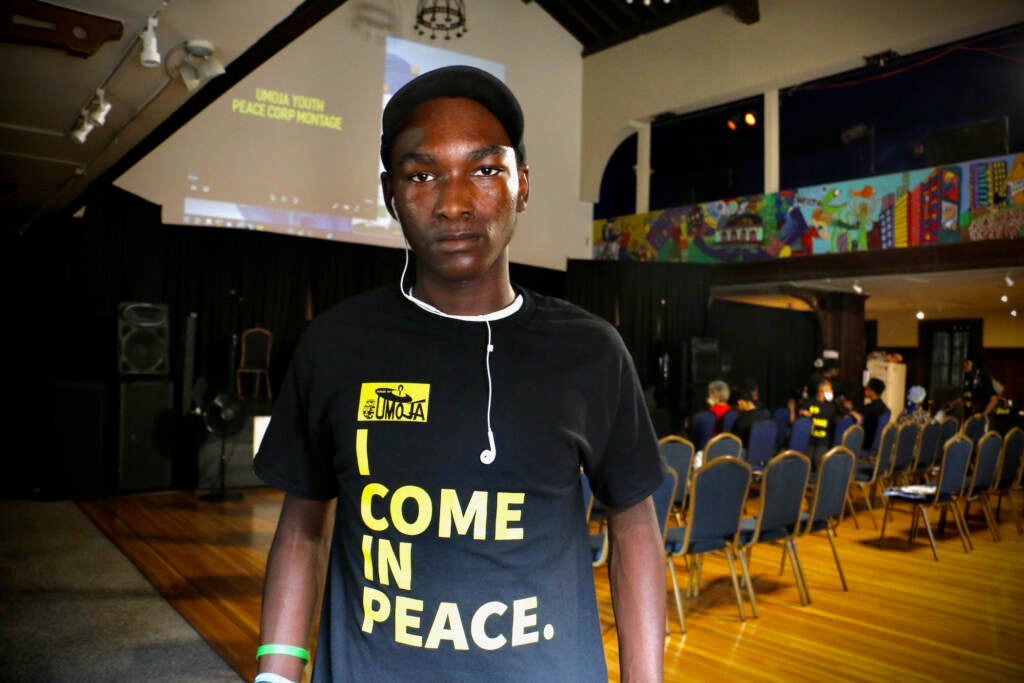
Organizers say the youth corps, still in its infancy, marks the beginning of a new era for the House of Umoja, which opened in West Philadelphia in 1969. It’s been credited with brokering peace between the city’s most violent gangs at that time. For decades it offered housing, mediation services, and educational assistance to gang-involved boys. Now leaders want to teach teens to act as positive role models and discourage gun violence among their peers.
“You’ve got to have the young people talking to the young people,” said Jacqueline Taylor-Adams, development director for the House of Umoja and program director of the peace corps.
It’s a tall order, with the city’s shooting rates at a record high and kids facing a slew of pandemic-related stressors. Former gang leaders who still work with the House of Umoja say the landscape of gun violence is different now — there are fewer formal groups, and the power and respect that used to be earned by climbing the ranks is now hastily acquired by carrying a gun. Some teens are afraid to be seen as weak, and social media can quickly cause petty interpersonal conflicts to escalate to gunfire.
John Johnson, a 68-year-old former Umoja resident who goes by the nickname “Baby John,” says the city can’t give up on young people.
“It is different, kids nowadays. But they can be touched,” he said. “If one don’t [listen], another one will. There’s always somebody who takes heed of what we say.”
Gun Violence Prevention Tactics From Umoja Leaders
- Clean up the block. When streets are tidy and active, trouble stays out
- Provide a haven. Many young people just need a place to feel safe and heard
- Provide a meal. Breaking bread makes peace talks go more smoothly
- Focus on work. Studies, chores, and job prospects can deter young people from engaging in crime
- Teach leadership. Help young people become good role models for one another
After a long history in violence prevention, the House of Umoja remains respected by other grassroots organizations, and newer groups continue to seek advice from matriarch and master peace broker Queen Mother Falaka Fattah. The organization no longer receives funding from the city or referrals from the criminal justice system, but is determined to make its own inroads with at-risk youth.
“I have no idea if this is going to work or not,” Fattah said, adding that she’s considering the peace corps a demonstration project. “I’m using some of the practices we utilized years ago, but I’m also incorporating the new generation and the way that they act. It’s a learning experience.”
‘She was mom’
The House of Umoja’s main meeting room was a little tight for the six or so teens who pushed through the front door on most weekdays this spring. They squeezed plastic chairs around a folding table, shirked off their backpacks, and chattered about the school day over a hoagie or a chicken plate.
When the day’s workshop began, the leader usually had to coax them into focus mode. There were several reminders about putting cell phones away.
During a June session, a career prep instructor asked them to stand up one by one and share their dream jobs: chef, dancer, skateboarder, engineer.
“I want to play football,” Hameen Jackson said when his turn came around.
They were then asked what it would take to be successful.
“Staying out of gun violence,” Hameen said. “Staying out of the streets.”
Jackson said when he walks into the program, there’s no personal drama or neighborhood beefs to worry about. Instead there are worksheets on personal budgeting, maintenance chores around the property, and special skills courses, such as dog training.
“Once you in House of Umoja, just pay attention,” he said. “Be good, be careful. Stay out of bad stuff or you’re going to end up being locked up.”
The scene isn’t so different from what went on in the house during the 1970s, when hundreds of boys sought refuge from the turmoil on the streets.
In 1968, Queen Mother Falaka Fattah attended a conference on the African concept of Umoja, meaning unity in Swahili, and started brainstorming ways to tackle gang violence in her neighborhood. A year later, when she and her late husband David Fattah learned that one of her sons was part of a gang, she invited members of that group to live with them in their West Philadelphia home.
“There were over 200 kids that would have considered it a trophy to kill my child,” she said. “I became absorbed with ‘what can I do to save my child?’”
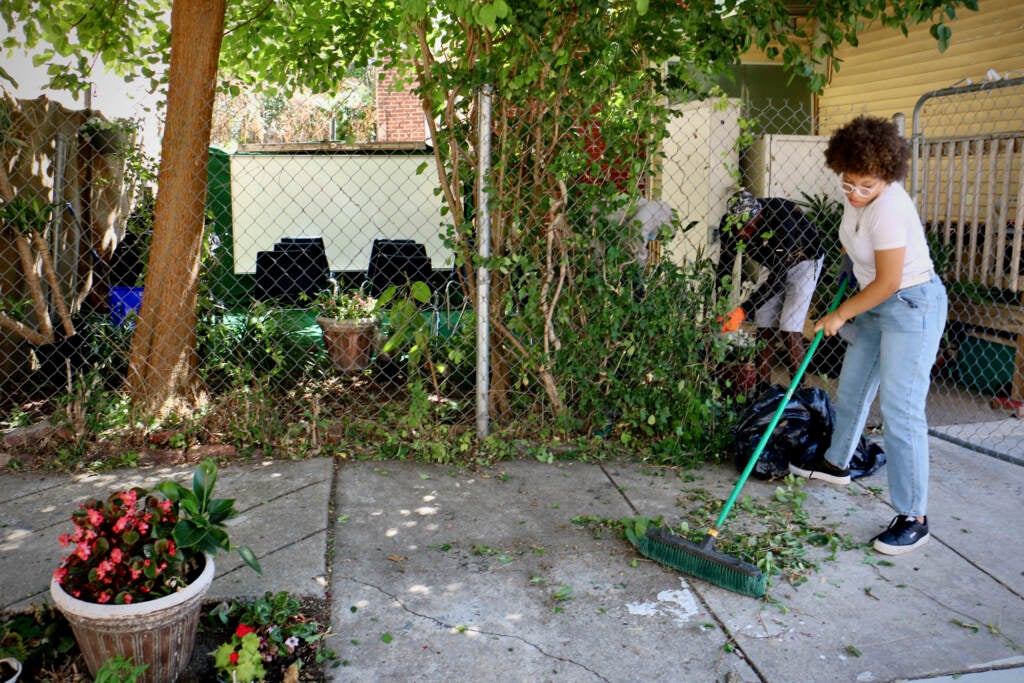
The space became neutral territory where young men left their disputes at the door in exchange for food, shelter, leadership development, and paid work. Young people from other gangs started asking for lodging. With support from community organizations and religious groups, the Fattahs bought up 23 homes on the block for use as dormitories, 18 of which they still own. Soon there were 300 boys from 73 street gangs living in the House of Umoja complex, according to a 1978 U.S. Congress report.
The organization, which is now run by Falaka Fattah and her grandson Anthony Bannister-Fattah, is perhaps best known for the Imani Peace Pact of 1974. The historic conference took place at a Quaker meeting house, where between 500 and 700 gang members gathered to declare that they would not fight one another and vowed to spread the word of peace. The following year, homicide rates dropped.
The 1978 congressional report said the following about the decline:
“The persons largely responsible for this change are the David and Falaka Fattah family … with unorthodox ideas and no formal training in social work, the Umoja program has taken in and embraced some of Philadelphia’s toughest gang members in a new concept of peace.”
Over four decades, the House of Umoja worked with roughly 3,000 boys, according to Falaka Fattah. The program was based on the African extended family model, meant to provide support and structure to boys growing up in dysfunctional home environments. Days consisted of chores, courses in African customs, school study, and job preparation. When a resident strayed, they met with a tribal council to determine a productive form of discipline, such as helping a neighbor or cleaning a public space, and young men who adhered to the program were awarded the name “Fattah” in a special ceremony.
Baby John, who started living in the house at age 12 after becoming involved with the Moon gang, said that family structure — particularly the combination of love and discipline from Falaka Fattah — was what kept him and the other guys off the streets.
“We called her mom, she was mom,” he said. “She was nice, even when she got mad at me.”
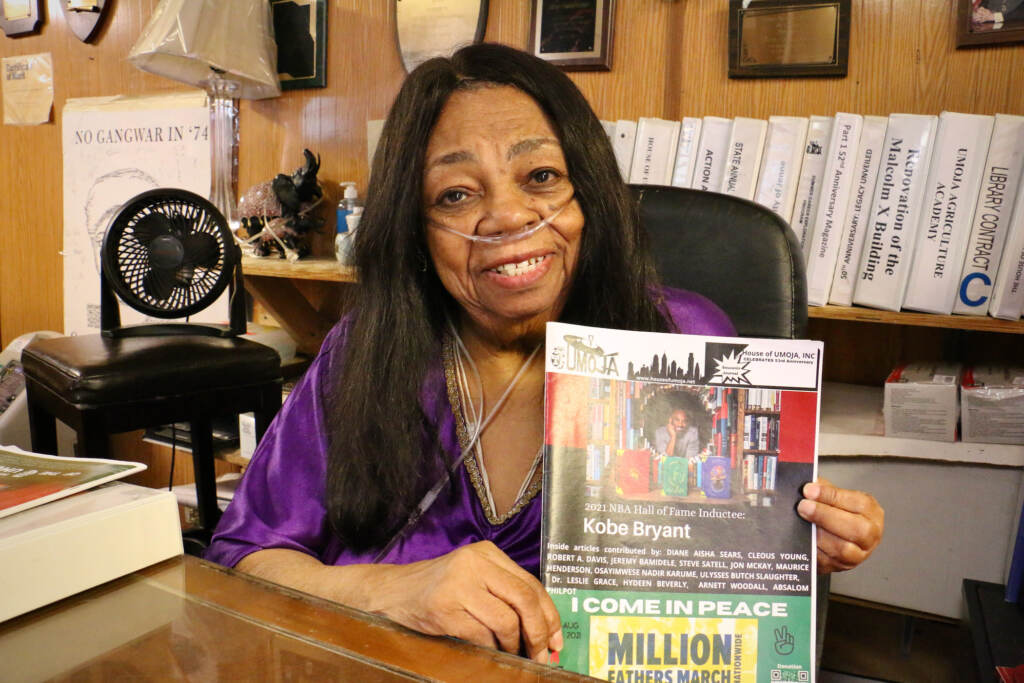
Everybody knew the rules, said House of Umoja site manager Hakim Tendaji, who started working at the House of Umoja when he was a college student.
“If you needed a place to sleep, you had a place to sleep,” he said. “They had to go to school. The guys that were 18 [and] older, you had to find a job. You had something to do.”
Being good neighbors was also part of the routine. Baby John remembers giving out food to families on the block, cleaning up the streets, taking field trips, and participating in talks with local politicians.
“People from the neighborhood would come in and get dug in at the House of Umoja,” he said. “You’d see people helping ladies across the street. Ain’t nobody snatching pocketbooks in the neighborhood, ain’t no gun violence.”
Umoja’s leaders acknowledge that today’s youth are different from the young people they guided decades ago, and that the culture has changed as well.
Kendra Van de Water at YEAH Philly, a youth-focused gun violence prevention group founded in 2018, said gangs these days can be specific to just one block instead of a neighborhood. And there are plenty of disputes not related to gang culture.
“The social media altercations have really taken a turn and skyrocketed,” she said. “Now you see people being killed over social media issues, especially Instagram.”
And the days of fist fighting are over, she said.
“These days, people go out and get guns.”
She said making sure young people have input is key to designing a program that’s up-to-date.
“We’re always talking to young people, asking, ‘Does this make sense?’” she said. “They come to us with so many ideas, and we just implement them.”
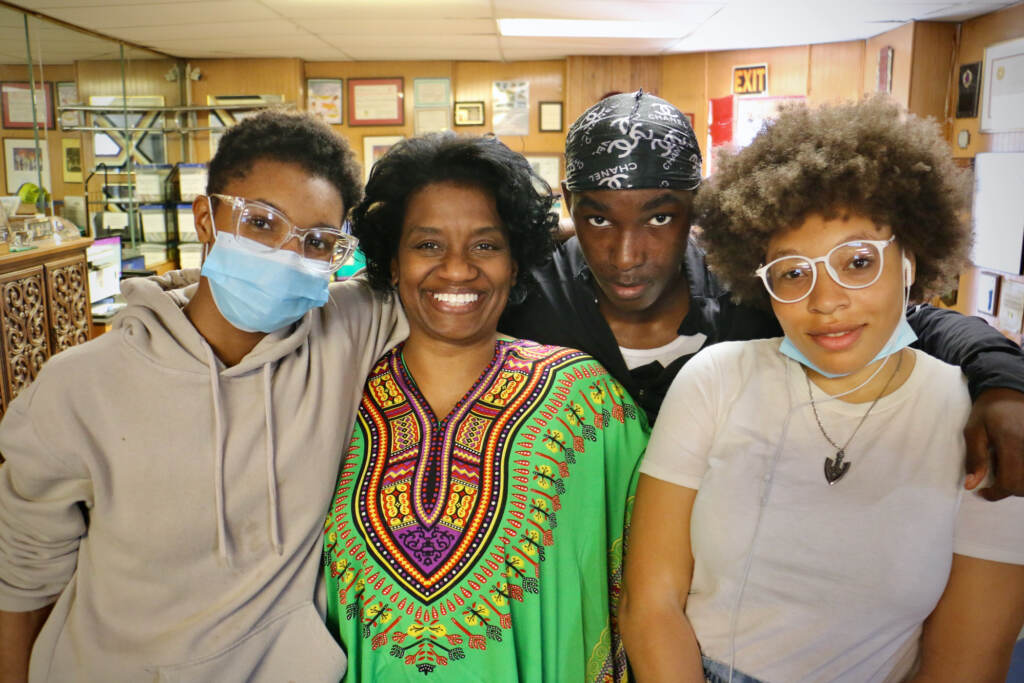
Block by block
The Fattah family believes that stemming the current gun violence crisis will take a combination of building up youth leadership and creating unity across neighborhoods. They’ve created a “block by block” strategy designed to create “violence-free zones” based around the idea of an “intentional community.”
The youth peace corps is part of that, along with plans to:
- mobilize block captains to identify families in need
- provide sanctuary space for block captains and block members to voice their needs and devise solutions
- give voice to people ages 15-25 through youth editions of Umoja magazine
- implement a “Planting Seeds of Peace” messaging campaign throughout Carroll Park in partnership with local stores and restaurants
- host a yearly hybrid Healing Conference bringing stakeholders, community members, people ages 15-25, and wellness and behavioral health practitioners
Earlier this year, the House of Umoja was selected to receive $150,000 in state funds over a two-year period, on a reimbursement basis, to execute these plans.
The House of Umoja used to be in contract with the city and state, and young offenders could be sent to live at the house instead of in a juvenile detention facility. But the residential components of Umoja stopped in 2010. The years that followed brought a cancer diagnosis for Queen Mother and a fatal heart attack for David Fattah.
Falaka Fattah wants to build the next generation of leaders, with a focus on kids who are at risk of becoming involved in violence. She estimates it will take roughly $10 million to get the homes on the block ready to host programming again. The organization is having a donor conference later this year to try to raise the funds.
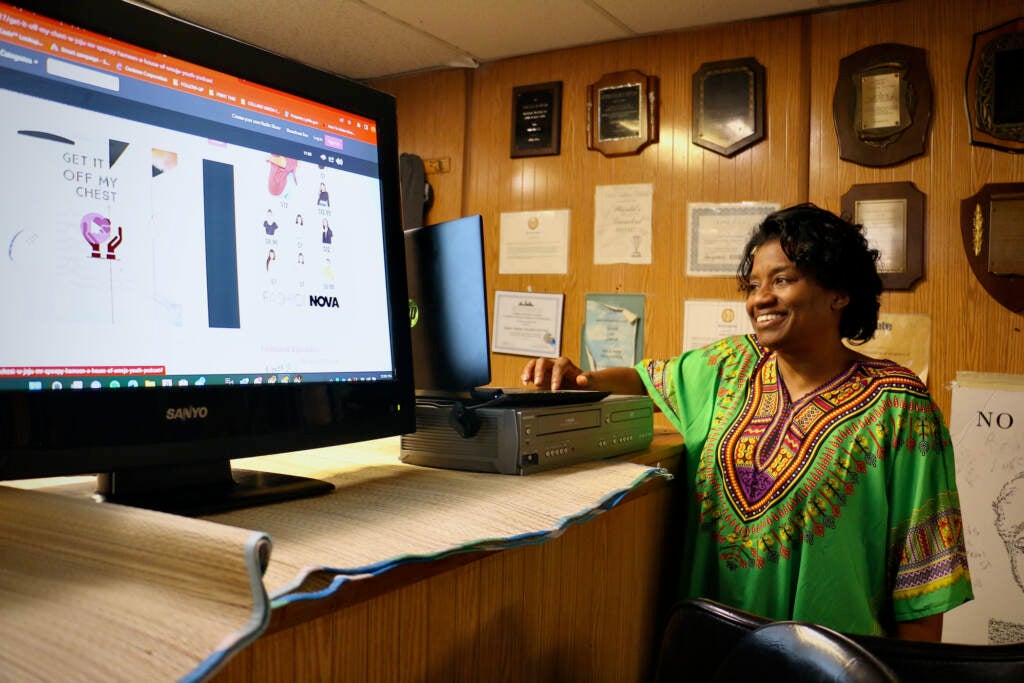
Philadelphia’s Department of Health Services is currently seeking applications from community groups that want to support crime-involved youth, and the Office of Policy and Strategic Initiatives for Criminal Justice and Public Safety continues to distribute grants to community anti-violence groups. But Queen Mother said she doesn’t plan to seek financial support from the city.
“I’m not trying to get bogged down in bureaucracy, I’m trying to get something done,” she said.
Meanwhile, the House of Umoja is preparing to welcome a fall cohort of the youth peace corps. It’s also supporting a new initiative called “Partners in Peace,” a coalition of nonprofit groups that began working toward a ceasefire last Thanksgiving.
City Councilmember Curtis Jones, who lived at the House of Umoja as a boy, said city leaders would do well to take some of the lessons of the House of Umoja and apply them to children who are involved with the Department of Health Services because of truancy or issues at home.
“Many of the young people that are identified in the DHS process are the same adults that are sentenced later on,” he said. “The House of Umoja and this peace corps have a unique role to play in starting to teach conflict resolution that doesn’t end in gun violence.”
Robert L. Woodson, a civil rights activist and scholar on urban issues who published several reports on the House of Umoja, said he’s baffled that the city of Philadelphia isn’t backing the effort.
“The city developed amnesia,” he said. “They went back to spending money on shot detectors and cameras and police and didn’t ever continue to invest in the next generation of healing agents.”
There are some nonprofit groups that are on board to help carry on Queen Mother Fattah’s vision.
“I feel it’s a bit ridiculous to not replicate the most successful efforts on record,” said Mazzie Casher, founder of Philly Truce. “Everything can be modified and updated.”
‘All Black children are at risk’
For Hameen Jackson, who has several friends involved with criminal activity, the threat of gun violence is real and stressful.
He said it would be “very easy” for him to get into trouble again.
“People will hook you up inside people hoods and all that,” he said. “And once you in people hoods, you beefin’ with people. And that’s how people die every day.”
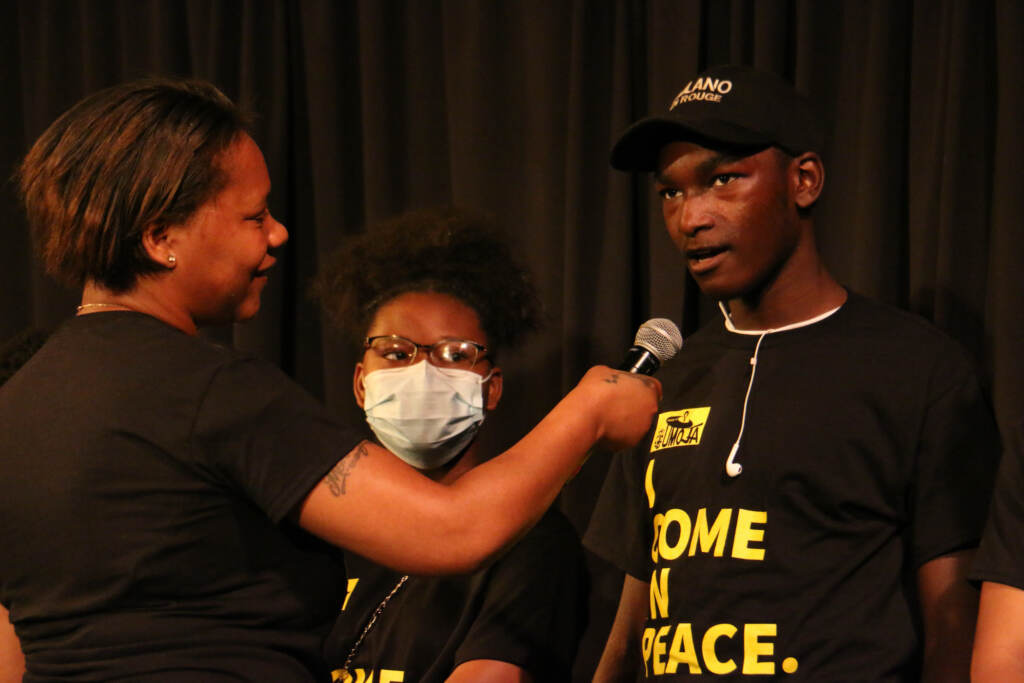
For others in the first cohort of the youth corps, gun violence is more of a peripheral concern.
Isaiah Dudley, among the oldest in the group at age 17, said he spends most of his time on his own block, which is close to the House of Umoja. He said he feels safe there.
“The community is well knit there, almost everybody knows everybody,” he said. “But I want to try to make it so that the peaceful nature of our block is spread to other blocks.”
Peace does seem to be sticking in that part of the city. There have been no fatal shootings in the immediate vicinity of the House of Umoja in 2022, according to the latest data from the city’s Office of the Controller.
Councilmember Jones said he’s verified this with police captains in the area.
“Whether it’s coincidence or not … in that area, gun crime and gun violence is still there, but it’s slightly less,” he said.
That might be due in part to the fact that Falaka Fattah, as well as her grandson Anthony Bannister-Fattah and site manager Hakim Tendaji, have the respect of the block. On any given day you’ll find young men around the property, doing work around the now-dilapidated dormitories or running an errand for “mom.”
“A lot of these young guys, they put away their weapons when they come around here,” Tendaji said. “I have not seen anyone really want to fight one another. These guys here, they really trying to come around. They really trying to get their life together.”
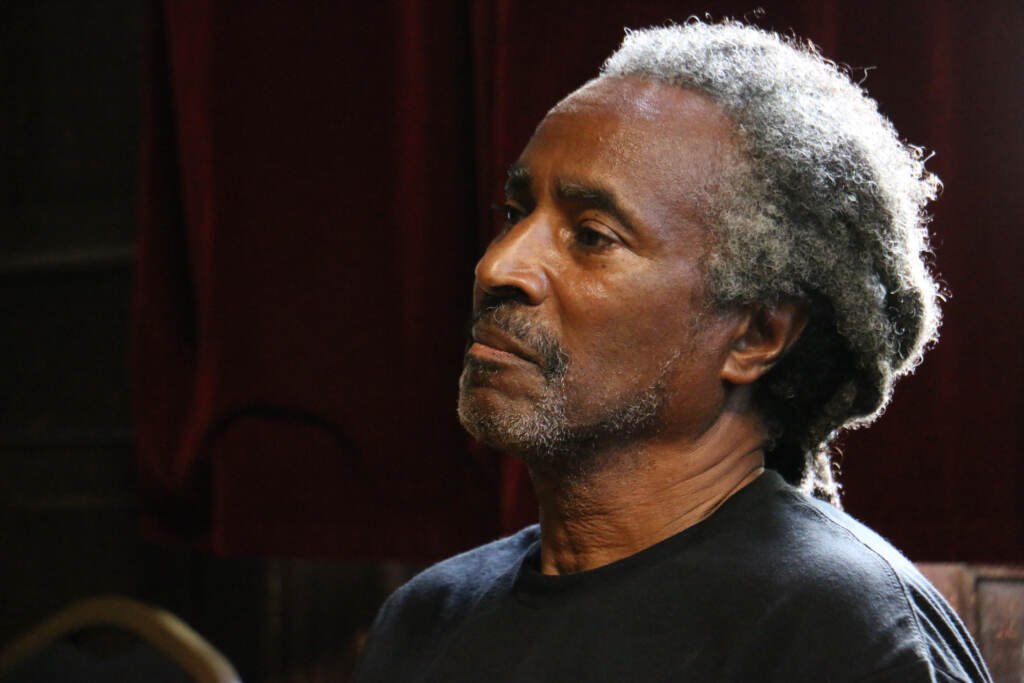
Baby John said in his day it was easier to get out of the game, because the stakes weren’t as high. Gangs were fighting with belts, zip guns, banister posts, and car antennas.
“We didn’t have guns in the neighborhoods the way it is now,” he said. “It’s out of order. You get the guns off the streets, that’s the key. Get the guns off the street, and start reaching out to this younger generation.”
Tendaji said today’s youth have been deprived of the strong family structure and economic stability needed to feel hopeful about their own future.
“So when they get a gun in their hand they feel powerful,” said Tendaji.
Jacqueline Taylor-Adams, who headed up the House of Umoja youth peace corps, said even if she can’t find the kids most likely to pick up a gun, she can protect the ones most likely to be hit by a bullet.
“All Black children are at risk of being victims,” she said.
For Hameen Jackson, it’s all about staying busy. He’s been working at the House of Umoja five days a week this summer through an employment initiative with the Philadelphia Youth Network. He plans to return for the peace corps program in the fall, and he wants to get the word out.
“I’m trying to get my friends in here, so they don’t have to do any of the bad stuff that other people is doing,” he said.
The House of Umoja is celebrating its 54th anniversary with a Collard Green Cultural Festival on Sept. 3.
___
If you or someone you know has been affected by gun violence in Philadelphia, you can find grief support and resources here.
___
Editor’s note: This story has been updated to clarify the timeline of David Fattah’s death.
WHYY is your source for fact-based, in-depth journalism and information. As a nonprofit organization, we rely on financial support from readers like you. Please give today.


